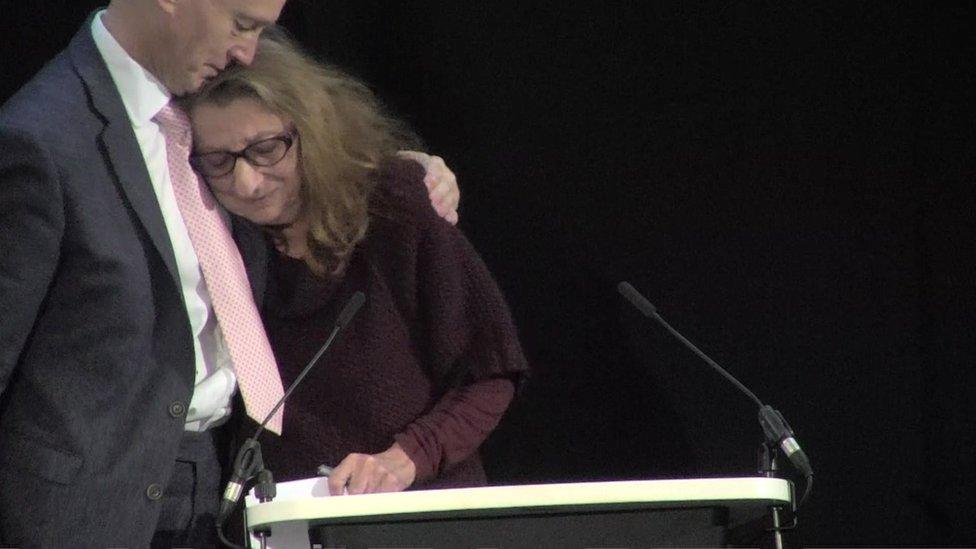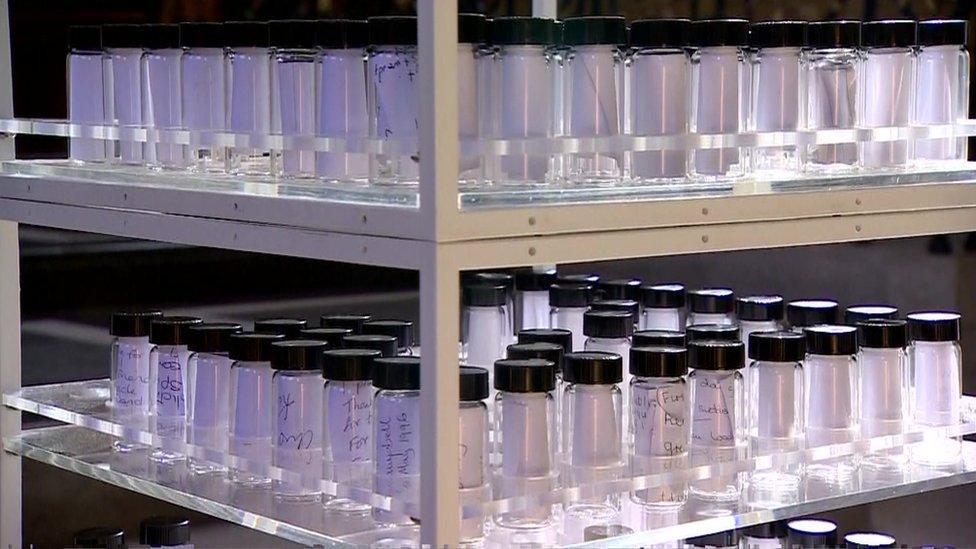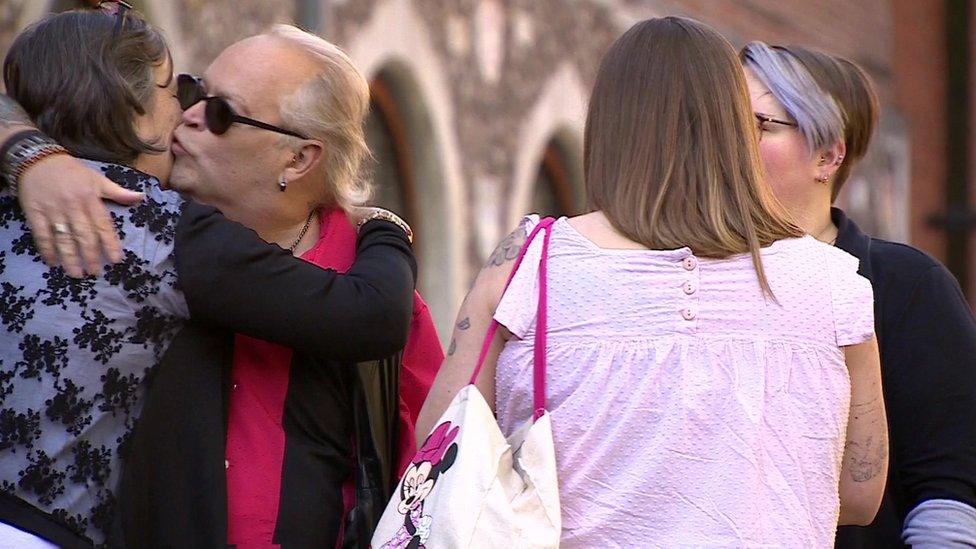Contaminated blood scandal: What have we learned so far?
- Published

Sir Brian hugs Della Hirsch
It has been said before that the contaminated blood scandal was the worst treatment disaster in the history of the NHS.
This week, we have heard that the public inquiry, which has just begun, will be the largest ever held in the UK.
There will be hundreds of thousands of documents to trawl through and nearly 1,300 individuals have registered themselves as "core participants" with personal stories they want to be heard.
One lawyer told the inquiry that this was a "truly momentous opportunity" though it could be more than two years before a final report emerges.
There was moving testimony at the opening hearings from patients and families.
Della Hirsch's son Nick, 35, died after developing hepatitis C as a result of his haemophilia treatment.
She talked of "the misery and appalling lack of care" from medical professionals and said the authorities had been "engaged in a complicity of silence".
Clearly emotional at the end of her speech, she was hugged by Sir Brian Langstaff - a moving and highly unusual sight at a public inquiry that underlined the judge's commitment to keep the victims at the heart of proceedings.
Its estimated that, in the 1970s and 1980s, 5,000 people with haemophilia and other blood disorders developed HIV or hepatitis C or both as a result of being treated with infected blood products, most of which had been imported from the US.
Government sorry for blood scandal
'I don't want him to have died in vain'
Both husbands died from contaminated blood
Donors included prisoners who sold their blood. Nearly 3,000 patients have died, including about 80 since the public inquiry was announced by the prime minister, in July 2017.
Others who had blood transfusions were also infected. Official sources had indicated before that this number might run to about 28,000.
But Sir Brian raised what he called "a truly sobering thought", that there might be "many thousands more" who may not feel well but have not been told that the reason could be that they are infected with hepatitis C.
One campaigner told the inquiry that as many as 300,000 could have been infected because of contaminated blood, though this figure is disputed by other experts.
Breathtaking scale
The scale of the scandal is breathtaking, so too the scale of possible knowledge of the problem at high levels in Whitehall and the NHS.

A moving video about the victims was played at the inquiry
A central role of the inquiry will be to establish whether some officials and doctors knew of the risks of using imported blood products and concealed them from patients being treated.
On top of that there is the question of whether civil servants and others tried to cover up what was known and not acted on.
The inquiry heard reports of documents being destroyed, including the private papers of a secretary of state, to try to "draw a line under the disaster".
Patients' medical records, it was said, had gone missing.
The Department of Health and Social Care's own lawyer Eleanor Grey QC, as well as offering an apology to victims, acknowledged that there had been "many reminders of what may, at worst, have been a cover-up or, at best, a lack of candour about past events".
She went on to say thousands of documents had already been delivered to the inquiry and, crucially, that the department would waive legal professional privilege, the device sometimes used by the government to block the release of records.
Lawyers for the inquiry have made clear that former ministers, including some who were in the cabinet, will be asked to provide written statements and in some cases to give oral evidence.
A letter from the then Prime Minister, John Major, in 1996, has already been quoted at the inquiry.
In it, he rejects the idea of the sort of compensation deal then being offered by the Irish government.

Those affected have left messages in bottles
He goes on to suggest it is best to use state funding to treat current patients rather than make payments to people who "received the best possible treatment at the time".
Sir Brian, in his opening statement, stressed the independence of the inquiry and set out his ambitions: "Frightened of no-one… to hold people to account where appropriate… to express its views at the end without fear or favour."
It will be a massive and unprecedented task and the consequences could be immense.
The inquiry will shine a light on conduct behind the closed doors of Whitehall and the NHS over two decades.
In France, Japan and Italy, politicians and officials ended up in court over contaminated blood scandals and that was nearly 20 years ago.
Victims and campaigners who attended this week's opening hearings say that the British establishment has dragged its feet for too long.
Two previous inquiries on the subject have been dismissed as irrelevant because they did not have UK-wide powers to compel witnesses to attend and gather official documents.

Families have waited years for an full inquiry
This time and after waiting three decades, victims, infected or affected, hope for something different.
They have welcomed what they have heard so far, including the fact they have been put at the heart of the inquiry by Sir Brian.
But the real test will come in April next year, when the public side of the inquiry reopens and witnesses and evidence are put under scrutiny.